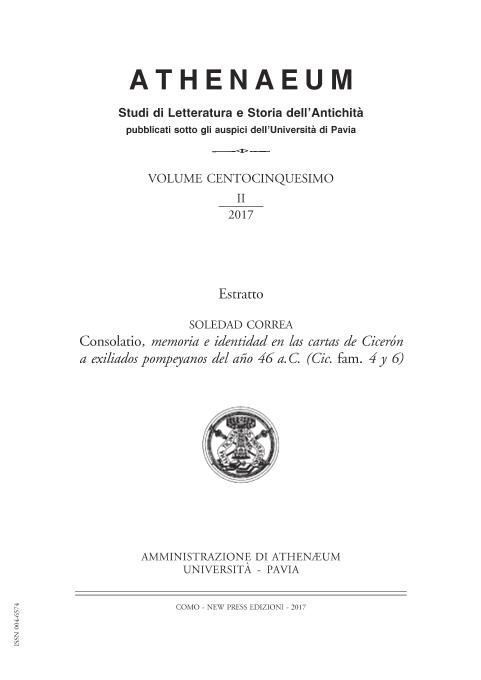Artículo
Consolatio, memoria e identidad en las cartas de Cicerón a exiliados pompeyanos del año 46 a.C. (Cic. fam. 4 y 6)
Título:
Consolatio, Memory and Identity in Cicero’s Letters to Pompeyans in Exile of the Year 46 B.C. (Cic. fam. 4 and 6)
Fecha de publicación:
12/2017
Editorial:
Università di Pavia
Revista:
Athenaeum
ISSN:
0004-6574
Idioma:
Español
Tipo de recurso:
Artículo publicado
Clasificación temática:
Resumen
Taking into account the fact that ancient consolatio´s declared aim is not political but psychotherapeutic, the current paper intends to show how Cicero uses this genre as a protected literary forum to renegotiate his identity, and build a common discursive memory of the civil war. Firstly, the consolatory features contained in these political letters (fam. 4.7-10; fam. 4.13; fam. 4.14; fam. 6.1-4; fam. 6.6; fam. 6.10a y 6.10b; fam. 6.12; fam. 6.13 y 6.14; fam. 6.20 y 6.21; fam. 6.22) enable him to build his addressees as a homogeneous group, as if all of them were expecting to benefit from Caesar´s clementia. If we consider Marcellus´ voluntary exile in Mytilene, this was far from being the case. Nevertheless, this polarization reinforces his position as a mediator, and justifies his proximity to Caesar. In addition, Cicero plays down the differences that existed between him and his addressees, building a common identity by focusing on what they shared, i.e., the fact that all of them have been vanquished by Caesar. Secondly, he employs these letters in order to build an apologetic revision of his criticized conduct during the civil war.
Palabras clave:
Epistulae Ad Familiares
,
Consolatio
,
Memoria
,
Identidad
Archivos asociados
Licencia
Identificadores
Colecciones
Articulos(SEDE CENTRAL)
Articulos de SEDE CENTRAL
Articulos de SEDE CENTRAL
Citación
Correa, Soledad; Consolatio, memoria e identidad en las cartas de Cicerón a exiliados pompeyanos del año 46 a.C. (Cic. fam. 4 y 6); Università di Pavia; Athenaeum; 105; II; 12-2017; 551-568
Compartir




